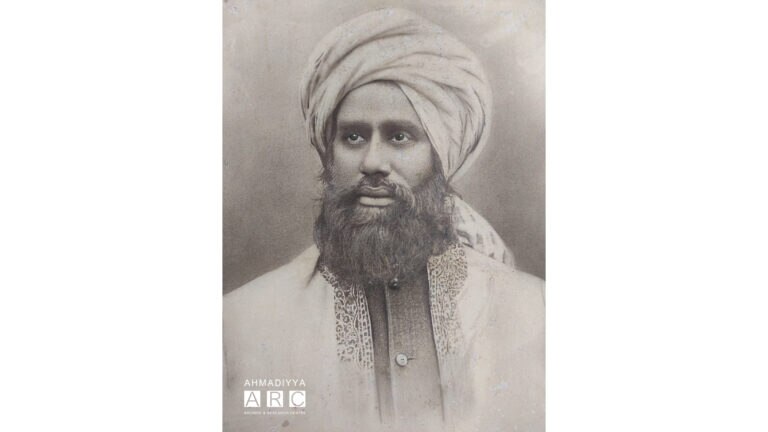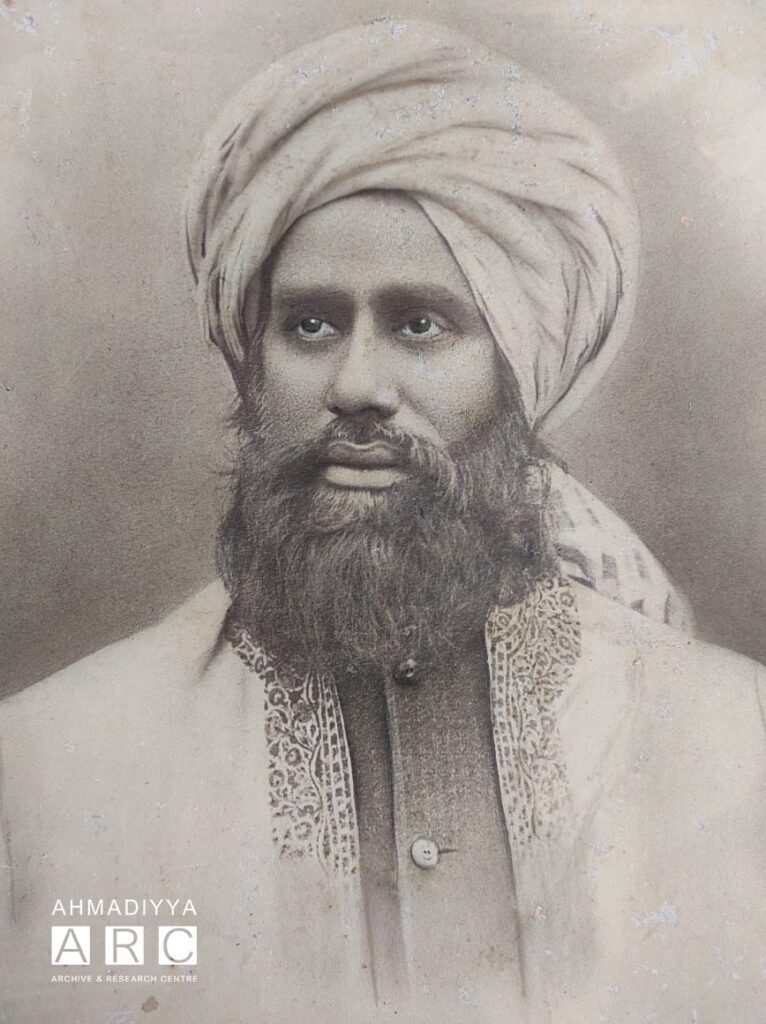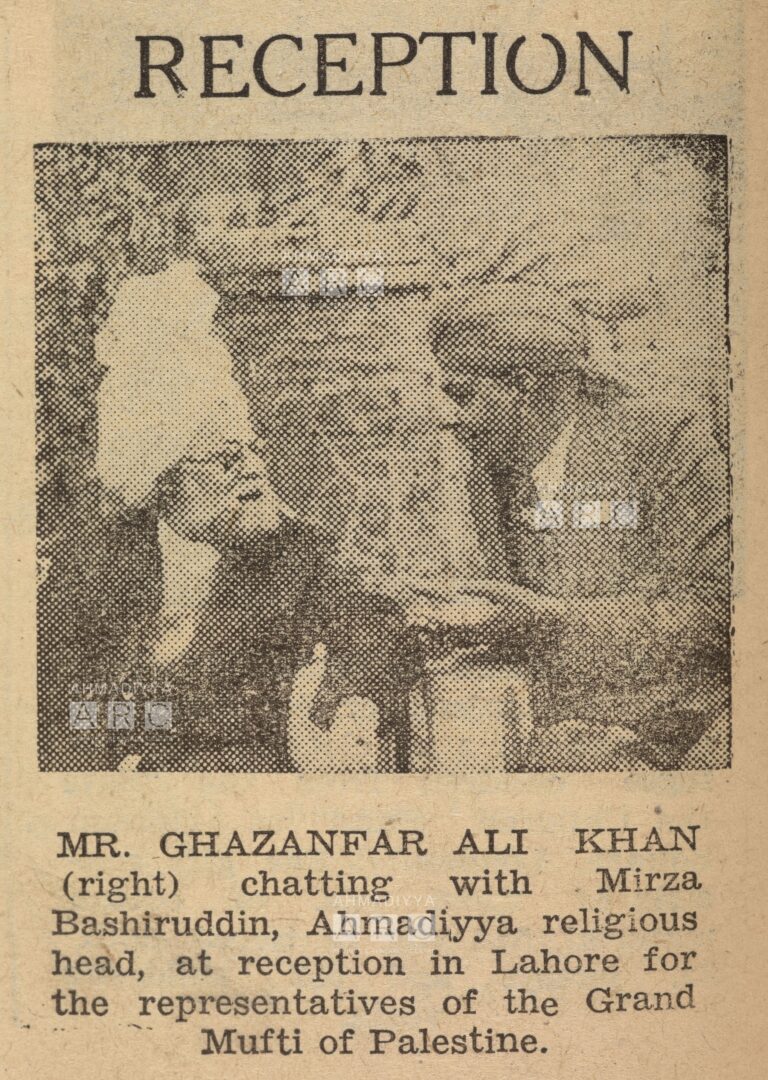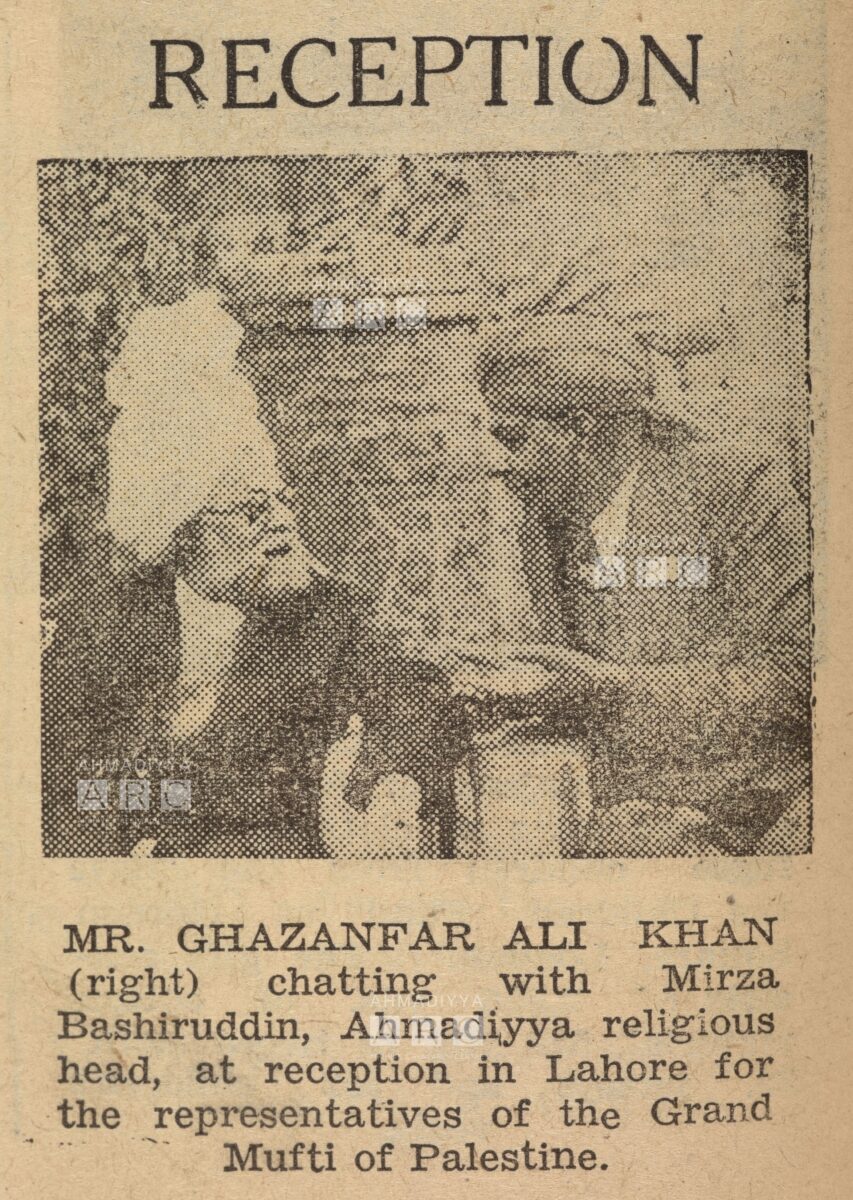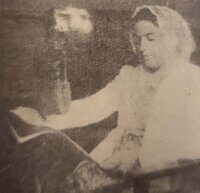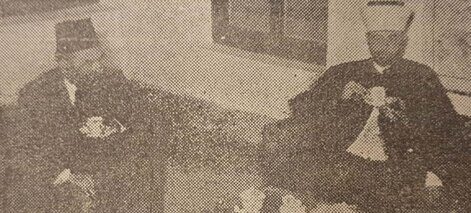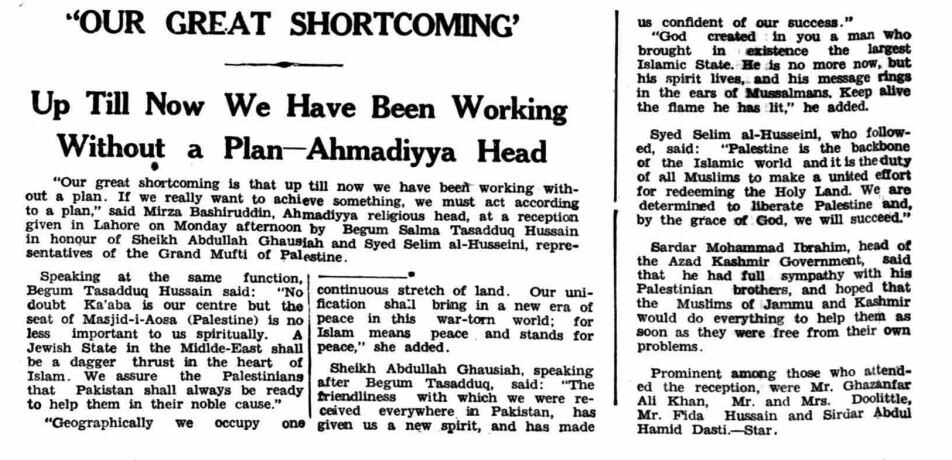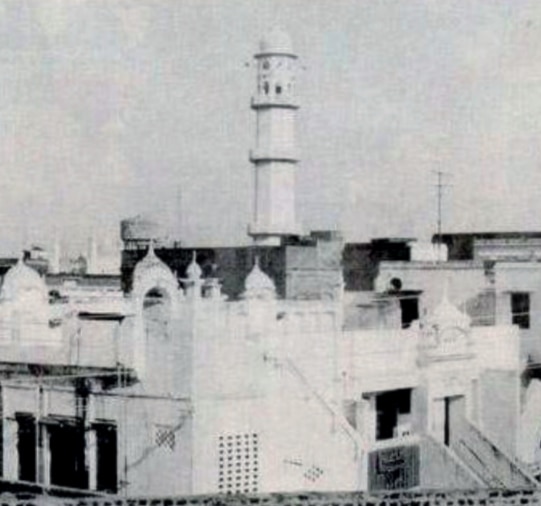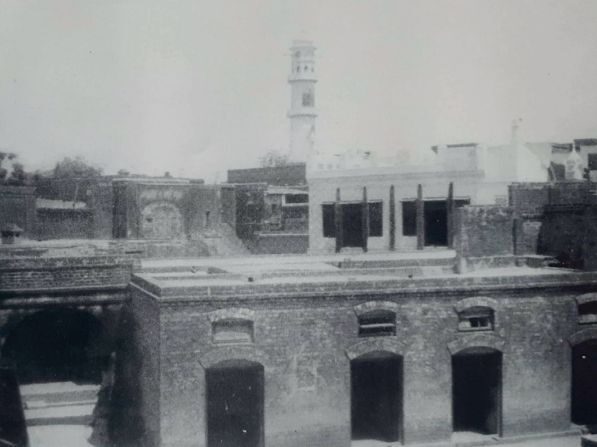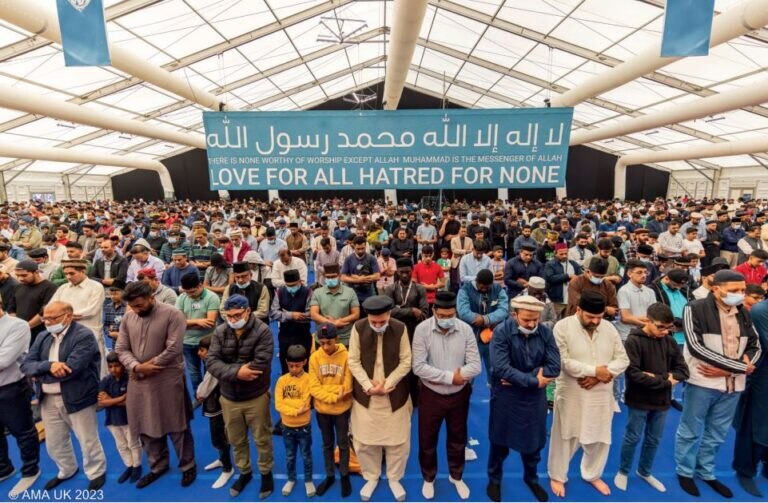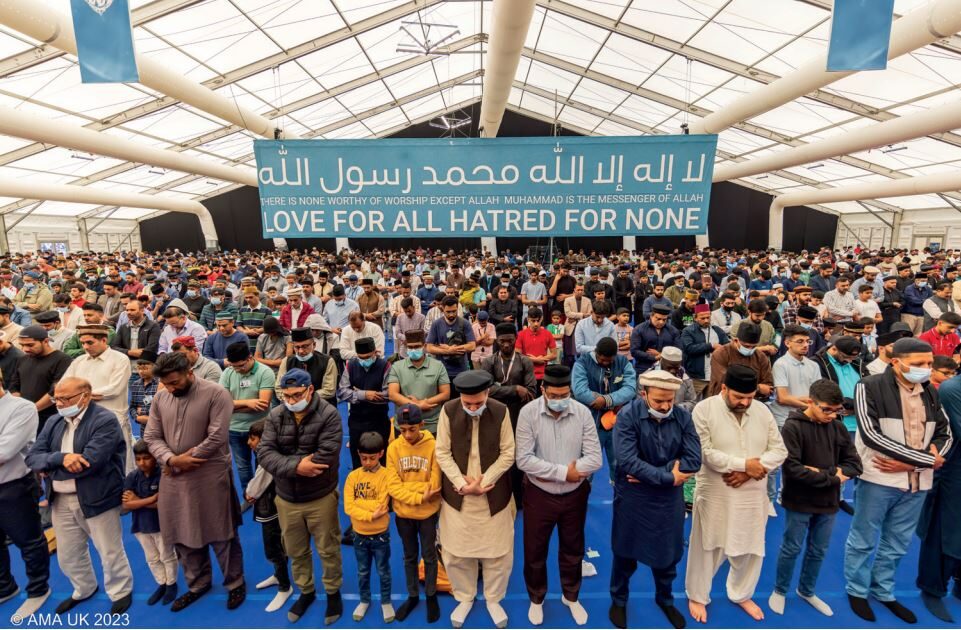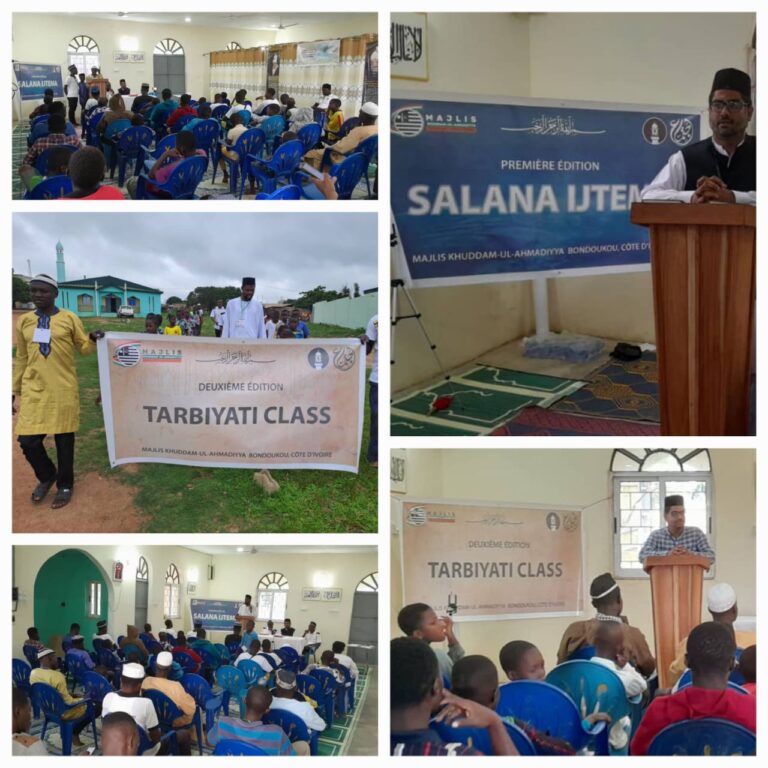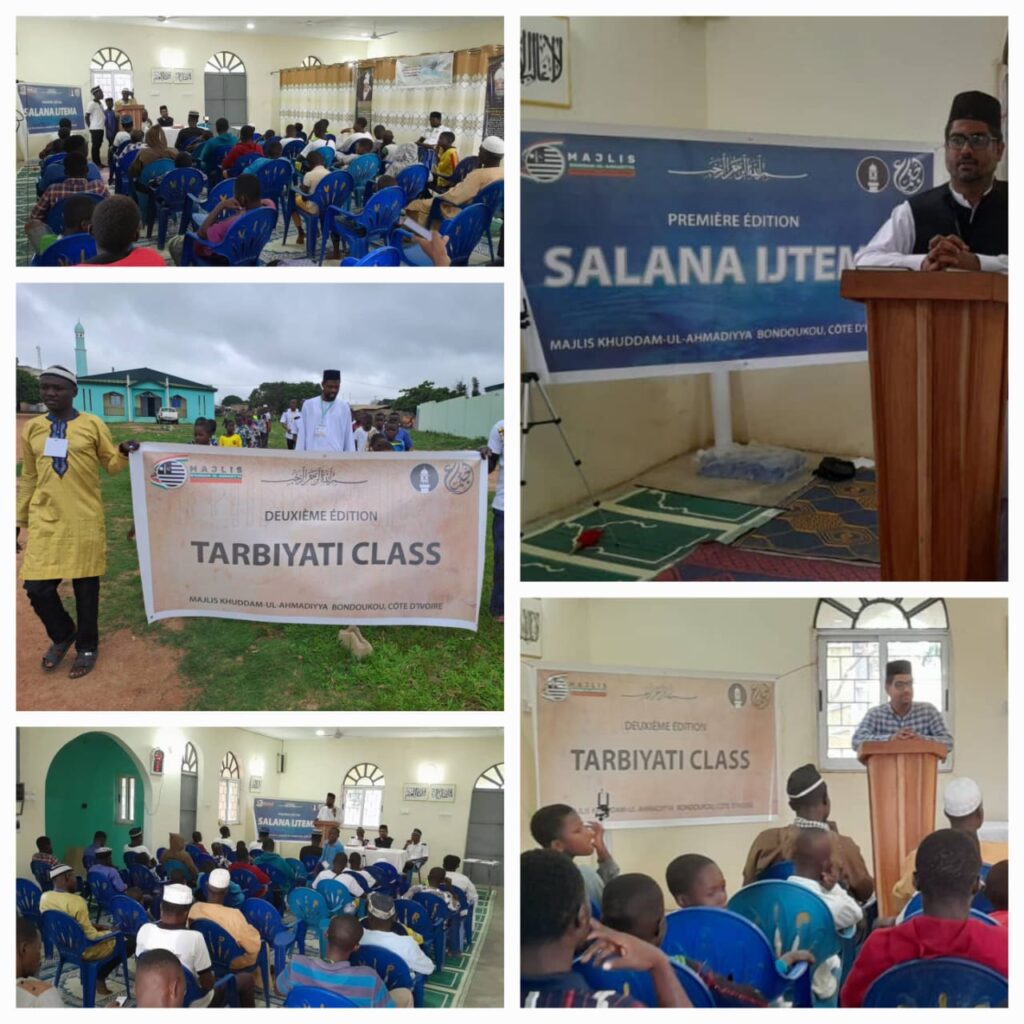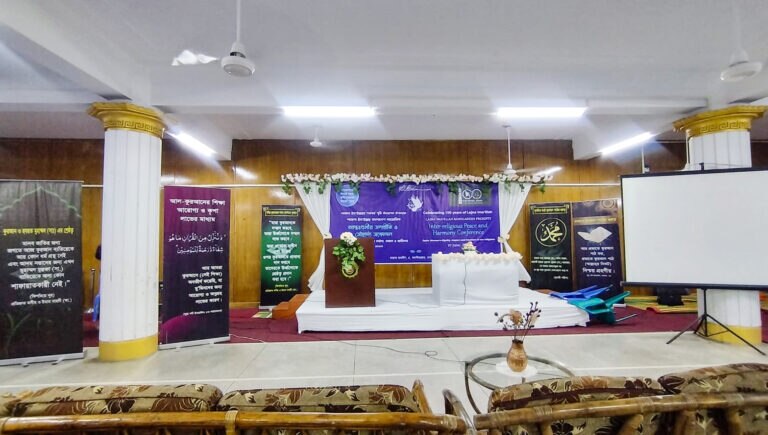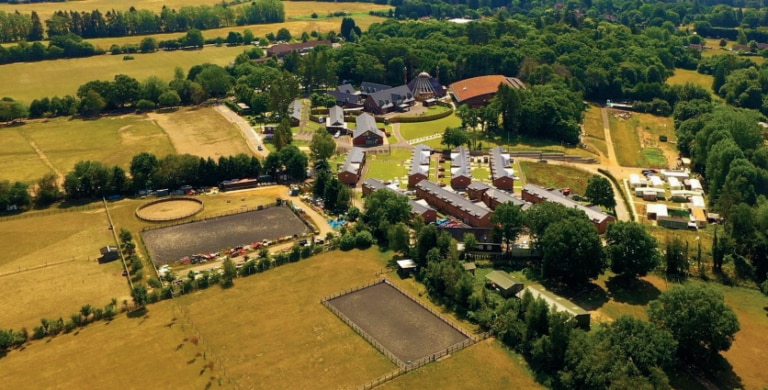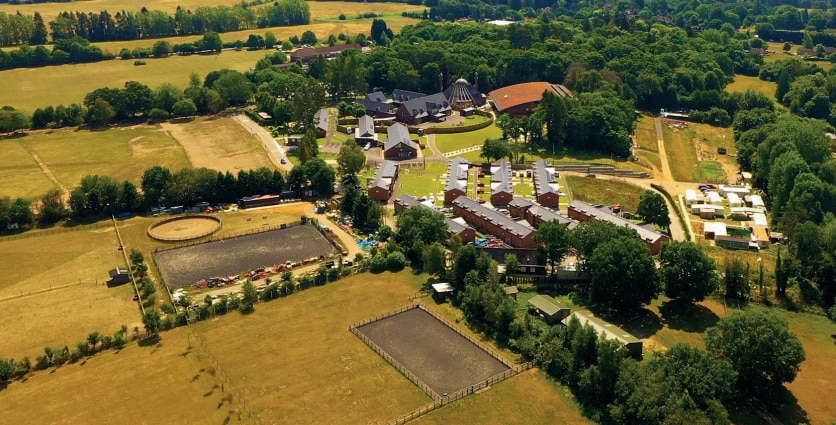Friday Sermon
7 July 2023
Muhammadsa: The great exemplar
After reciting the tashahud, ta‘awuz and Surah al-Fatihah, Hazrat Khalifatul Masih Vaa stated:
In the previous sermon, whilst mentioning an incident of the disbelievers of Mecca being overawed by the Muslims was related, it was stated that a disagreement between Abu Jahl and ‘Utbah ensued regarding the battle. Upon hearing the taunts of Abu Jahl, ‘Utbah declared that he would take part in the war and hence a battle commenced. In the details regarding this, it is written that ‘Utbah bin Rabi’ah set out, walking between his brother, Shaybah bin Rabi’ah, and his son, Waleed bin ‘Utbah. They crossed all the ranks and asked for a duel. (Ibn Hisham, Al-Sirah al-Nabawiyyah, p. 246, Dar al-Kutub al-‘Ilmiyyah, Beirut, 2001)
Hazrat Alira relates that ‘Utbah bin Rabi’ah stepped forward, followed by his son and brother, and asked who would fight him. Some young men from the Ansar [Muslims native to Medina] answered his call. ‘Utbah asked the Ansar who they were. They told him who they were. ‘Utbah replied to them: “We are not concerned with you! We only seek to fight our uncle’s sons.” Meaning that he only wanted to fight the Quraish, the people of Mecca and not the Ansar! He then loudly proclaimed: “O Muhammad! Send forth our equals from among our relatives in order to fight us!” Upon this, the Holy Prophetsa said: “O Hamzah, step forward! Arise, O Ali! Go forth, O ‘Ubaidah bin Harith!”
Hazrat Hamzahra was the paternal uncle of the Holy Prophetsa and Hazrat Ali and Hazrat ‘Ubaidah were his paternal cousins. Hazrat Alira says: “Hamza marched towards ‘Utbah, I advanced towards Shaybah. Hazrat ‘Ubaidah and Waleed fought each other fiercely, and both of them had wounded and weakened the other. Following our respective duels, we turned towards Waleed. We killed him and picked up Hazrat ‘Ubaidah and brought him back.” (Sunan Abu Da’ud, Kitab al-Jihad, Bad fi al-Mabarazah, Hadith 2665; Al-Lu’lu al-Maknun, Sirat Encyclopedia, Vol. 2, p. 48, Maktabah Dar al-Islam, Riyad, 1433 AH)
Hazrat Hamzahra and Hazrat Alira had already killed their opponents. When Hazrat Hamzahra and Hazrat Alira brought their companion, Hazrat ‘Ubaidah, back into their army, his foot had already been severed. When he came before the Holy Prophetsa, he said: “O Messengersa of Allah! Am I not a martyr?” The Holy Prophetsa replied: “You are certainly a martyr!” (Tarikh at-Tabari, Vol. 2, p. 32, Dar al-Kutub al-‘Ilmiyyah, Beirut, 2012)
Hazrat ‘Ubaidah, the paternal cousin of the Holy Prophetsa, could not recover from these wounds and passed away on the journey back from Badr. (Sirat Khatamun Nabiyyin, p. 360)
Regarding Hazrat ‘Ubaidahra bin Harith, it is mentioned in a narration that when his foot was severed by the sword, his comrades carried him back. When he was brought to the Holy Prophetsa, he was placed beside him. The Holy Prophetsa placed his blessed foot under Hazrat ‘Ubaidah’sra foot and with an expression of love, ‘Ubaidah looked to the Holy Prophetsa and said: “O Messengersa of Allah! If Abu Talib were alive today, he would know that I am most entitled to his words.” Following this, he recited couplets of Abu Talib, the translation of which is as follows:
“By the House of Allah! You lied that Muhammadsa would be left alone. Until now, we have not even defended him with our spears or arrows. You have lied that we will hand him over to you. For this, you will have to walk over our corpses, a time when we would be heedless of even our own sons and daughters!” Hearing this, the Holy Prophetsa said: “I am a witness that indeed you are a martyr!” (Subul al-Huda wa al-Rashad, Vol. 4, pp. 35-36, Dar al-Kutub al-‘Ilmiyyah, Beirut, 1993; Usd al-Ghabah, Vol. 3, p. 548, Dar al-Kutub al-Ilmiyya, Beirut)
There is mention of a prayer of Abu Jahl on this occasion. When the two armies faced one another, in other words when the full-scale battle was about to commence, Abu Jahl prayed, “O God, today, destroy the one among us who breaks the ties of kinship and speaks of that which we have never heard of.” (Sirat Ibn Hisham, p. 428, Dar al-Kutub al-‘Ilmiyyah, Beirut, 2001)
In relation to this, the Promised Messiahas writes:
“During the Battle of Badr, a man named Amr bin Hisham – who later came to be known as Abu Jahl and was the chieftain and ringleader of the Quraish – prayed in the following words:
اللُٰھُمَّ مَنْ کَانَ مِنَّا اَفْسَدَ فِي الْقَوْمِ وَ اَقْطَعَ لِلرَّحْمِ فَاَحِنْہُ الْيَوُمِ
“‘O God, whoever among us (referring to himself and the Holy Prophetsa) in Your estimation is the most rebellious of our people, is causing disunity, and is becoming the means of breaking the ties of kinship by severing familial bonds and depriving the people of their rights, destroy him today.’
“What Abu Jahl meant by these words was that God forbid, the Holy Prophetsa was a mischief-maker, who has caused tensions among the people, and that he was unjustly creating discord within the religion of the Quraish, and that He had violated all the rights of the people and became the means of cutting ties of kinship. It seems that Abu Jahl was certain that, God forbid, the life of the Holy Prophetsa was unholy and impure. It was then that he made the heartfelt prayer, yet he was unable to live, perhaps even an hour after making this prayer and the wrath of God struck him and cut his head off in that very place. On the other hand, the one whose pure life he used to slander emerged from that battlefield victorious.” (Chashma-e-Ma‘rifat, Ruhani Khazain, Vol. 23, pp. 174-175)
Scenes of the battle have been described in one place as follows:
“Now, the field of battle was heated by bloodshed. Before the Muslims was a party three times their number, which had entered the field of battle, embellished with all kinds of military equipment, determined to erase all traces of Islam. The poor Muslims were fewer in number, less equipped and struck by shocks of poverty and exile, and as far as apparent means were concerned, they were prey of a few minutes before the people of Mecca. However, they had become intoxicated by the love of Divine Unity and Prophethood. Living faith is a power in comparison to which there is no greater power on earth, and it had instilled within them a supernormal strength. At that time, in the field of battle, they were displaying an unparalleled example of service to the faith. Every man would step ahead of the other, and seemed restless to offer his life for the sake of God. Hamzahra, Alira and Zubairra cut down rank upon rank.” (The Life & Character of the Seal of Prophetssa, Vol. 2, pp. 151-152)
It is recorded regarding the first martyr among the Muslims that Hazrat Mihjahra, the freed slave of Hazrat Umarra, was made a target of arrows and was thus martyred. He was the first among the Muslims to embrace martyrdom [in the battle]. Thereafter, Hazrat Harithah bin Suraqahra, a person from among the Bani Adiyy bin Najjar tribe, attained martyrdom. He was drinking water from a reservoir when an arrow was shot in his direction, which hit him in his neck, resulting in his martyrdom. (Sirat Ibn Hisham, p. 428, Dar al-Kutub al-‘Ilmiyyah, Beirut, 2001)
Hazrat Anasra relates that Harithah bin Suraqah bin Harithra was martyred in the Battle of Badr whilst he was still in his youth. His mother, Rabi’ah bint Nazar, the aunt of Hazrat Anasra, went to the Holy Prophetsa and said, “O Messengersa of Allah, you know full well the regard I had for Harithahra. If he is in Paradise, I shall remain patient and hope for reward, but if it is anything other than this, then you will see what I shall do.” The Holy Prophetsa replied, “Alas! Have you gone mad? Is there only one paradise?” The Holy Prophetsa then said, “There are many paradises, and your son is in Jannah al-Firdaus.” (Sahih al-Bukhari, Kitab al-Maghazai, Bad Fazl Man Sahida Badran, Hadith 3982; Tabaqat al-Kubra, Vol. 3, p. 387, Dar al-Kutub al-‘Ilmiyyah, Beirut, 1990)
It is written in relation to the passion and resolve displayed by the Companions for Jihad, that the Holy Prophetsa said, “Whoever fights today with patience and deeming it a reward, without fleeing, God shall make them enter paradise.” When Umair bin Humam of the Banu Salamah heard this, he had some dates in hand, which he was eating at the time. Hearing this, he said, “How excellent is this! The only thing between me and paradise is if these people kill me.” He then picked up his sword and fought until he was martyred. Auf bin Harithra, son of Afra’, asked the Holy Prophetsa, “O Messengersa of Allah, what action of His servant pleases Allah Almighty?” He answered, “To slay an enemy without wearing armour.” Upon this, he removed all his armour and threw it away, and after slaying many disbelievers, he was martyred. (Sirat Ibn Hisham, p. 428, Dar al-Kutub al-‘Ilmiyyah, Beirut, 2001)
In a narration of Sahih al-Bukhari regarding the killing of Abu Jahl, Hazrat Abdur Rahmanra bin Auf states, “I was standing in the rows during the Battle of Badr. When I looked around, I saw two young boys to my right and left, and their presence there did not leave me with a sense of security. I thought to myself, ‘These are young men or boys, how can they protect me?’ I did not feel safe. All of a sudden, one of them quietly asked me in a way so the other would not be able to hear, ‘Uncle, show me where Abu Jahl is.’ I replied, ‘My nephew, what have you got to do with Abu Jahl?’ He replied, ‘I have made an oath to Allah that if I find him, I shall kill him or be killed attempting it.’ Then, the other boy quietly asked me the same thing, in a way the other would not hear.”
Hazrat Abdur Rahmanra says, “It would have pleased me more to have two grown men in their place.” Meaning that despite their zeal and passion, he was not convinced and still desired two strong men to his left and right. He says, “I pointed towards Abu Jahl and told both of them. Immediately after hearing this, both of them pounced upon him like hawks and slayed him. These two boys were Mu’az and Mu’awwiz, the children of Afra’.” (Sahih al-Bukhari, Kitab al-Maghazi, Hadith 3988; Umdah al-Qari, Vol. Al-Sabi’ Ashar, p. 132, Dar al-Kutub al-‘Ilmiyyah, Beirut, 2001)
Hazrat Mu’azra states, “I heard people claim that no one would be able to get to Abu al-Hakam, and so I resolved that I would certainly attack him, hence, I leapt towards him and with a single strike of my sword, I cut his leg from the knee down. Ikrimah, his son, then attacked me and severed my hand so that it was only dangling by its skin. The entire day, I continued to fight in this state and when my pain exceeded, I placed my foot on my hand and tore it off.” (Tarikh at-Tabari, Vol. 2, p. 32, Dar al-Kutub al-‘Ilmiyyah, Beirut, 2012)
Upon the conclusion of the battle, the Holy Prophetsa stood amongst the slain and began to search for Abu Jahl. When he could not find him, he prayed:
اللّٰھُمَّ لَا تُعْجِزُنِيْ فِرْعَوْنَ ھٰذِہِ الْاُمَّةِ
“O Allah! Do not allow me to suffer defeat against the Pharaoh of this ummah. Do not allow him to escape from here.”
Following this, people began to search for him and Hazrat Abdullahra bin Mas‘ud eventually found him. (Al-Sirah al-Halabiyyah, Bab Zikr Maghaziyyah, Vol. 2, p. 236, Dar al-Kutub al-‘Ilmiyyah, Beirut, 2002)
According to another narration, the Holy Prophetsa also prayed the following:
“O Allah! Do not allow him to escape from Your grip.” (Tarikh at-Tabari, Vol. 2, p. 36, Dar al-Kutub al-‘Ilmiyyah, Beirut, 2012)
When the Holy Prophetsa ordered the people to find the body of Abu Jahl, Abdullahra bin Mas‘ud came across him whilst searching amongst those who had been slain. The Holy Prophetsa stated, “If you are not able to identify him, then you can recognise him by the wound mark on his knee. Once, on the occasion of a meal hosted by Abdullah bin Jud’an, I pushed Abu Jahl with such force that he fell on his knees and wounded his knee and the mark of the wound still remains on his knee. Ibn Mas‘ud states, “I managed to identify him by that very mark and at the time he was taking his final breaths. I placed my foot on his neck since he had tormented me a great deal in Mecca. I then said, ‘O enemy of God! Have you seen how God has humiliated you?’ Upon this, he said, ‘What is the reason for me to feel humiliated? So what if you manage to kill someone. There is nothing more to it. However, have you ever killed someone who possesses a loftier rank than me? Now, tell me, who was victorious in the battle?’”
Hazrat Abdullahra bin Mas‘ud states, “In his final moments, whilst I had my foot placed on his neck, Abu Jahl said to me, ‘O you lowly shepherd, you have set foot on a place where you should not have.’”
Abdullahra bin Mas‘ud states, “I then severed his head and brought it before the Holy Prophetsa and placed it at his feet and humbly submitted, ‘O Messengersa of Allah! This is the head of Abu Jahl, the enemy of God.’ Upon this, the Holy Prophetsa expressed his gratitude to God and said:
اللّٰہُ الَّذِي لَا اِلٰہَ غَيْرَہُ
‘Holy is He, Who has no partner.’”
This is a narration from Ibn Hisham. (Sirat Ibn Hisham, p. 433, Darl al-Kutub al-‘Ilmiyyah, Beirut, 2001; Sharh al-Zurqani, Vol. 2, p. 297, Dar al-Kutub al-‘Ilmiyyah, Beirut; Sirat Ibn Hisham (translated), Vol. 1, p. 447, Idarah Islamiyyat)
In another narration, when Hazrat Abdullahra bin Mas‘ud killed Abu Jahl, he came before the Holy Prophetsa and informed the Holy Prophetsa about Abu Jahl’s death. The Holy Prophetsa then walked alongside Hazrat Abdullahra bin Mas‘ud and stated, “By Allah, there is none worthy of worship except Him.” Abdullahra bin Mas‘ud also repeated the same that “By Allah, there is none worthy of worship except Him.” The Holy Prophetsa then stood beside the dead body of Abu Jahl and said, “O enemy of Allah! May all praise be to Allah, Who has humiliated you.” (Musnad Imam Ahmad bin Hanbal, Vol. 2, p. 165, Hadith 44242, Alam al-Kutub, Beirut, 1998)
Hazrat Qatadahra narrates that the Holy Prophetsa stated, “Every ummah has a Pharaoh and the Pharaoh of my ummah is Abu Jahl. Allah the Almighty caused him to be killed very severely. The two sons of Afra and angels brought him down and Abdullahra bin Mas‘ud put him to an end.” (Subul al-Huda wa al-Rashad, Vol. 4, p. 52, Dar al-Kutub al-‘Ilmiyyah, Beirut, 1993.)
The Promised Messiahas states:
“Abu Jahl has been described as Pharaoh, but in my view, he was far worse than Pharaoh because, after all, Pharaoh had proclaimed:
اٰمَنۡتُ اَنَّہٗ لَاۤ اِلٰہَ اِلَّا الَّذِيۡۤ اٰمَنَتۡ بِہٖ بَنُوۡۤا اِسۡرَآءِيۡلَ
“‘[…] I believe that there is no god but He in Whom the children of Israel believe…’ (Surah Yunus, Ch.10: V.91)
“However, Abu Jahl did not accept at all. All of the disorder in Mecca was owing to him. He was extremely arrogant, selfish and pretentious.” (Malfuzat [1984], Vol. 4, p. 247)
The Promised Messiahas states:
“Just like Prophet Mosesas, the Holy Prophetsa also saved the pious people of his nation from the brutal and bloodthirsty people and he took them from Mecca to Medina just like Prophet Mosesas did. Abu Jahl, who was the Pharaoh of this ummah, perished on the battlefield of Badr.” (Tiryaq-ul-Quloob, Ruhani Khazain Vol. 15, o. 532
Hazrat Musleh-e-Maudra states:
“On the occasion of Badr, when the disbelievers of Mecca came, they were convinced that now they would surely kill the Muslims. Abu Jahl stated that they would celebrate and drink lots of wine. They were determined not to return without killing the Muslims. However, Abu Jahl was killed by two youths of Medina – the disbelievers of Mecca would consider the people of Medina to be extremely lowly people and would refer to them as farmers (they thought that these people only know how to grow vegetables and cultivate land and are unacquainted with the art of warfare. Nevertheless, these two youths killed him) and he was made to endure such humiliation that even his final wish could not be fulfilled. It was a custom amongst the Arabs that if any leader was killed in battle, his head would be severed by striking him at the lower end of his neck, so it remained long and served as a sign that a leader had been slain. Abdullahra bin Mas‘ud found Abu Jahl whilst he was wounded and not moving at all. He asked him his condition and Abu Jahl replied that he was not sorrowful over anything except the fact that he had been killed by two farming children of Medina. Abdullahra then asked if he had any last wishes, to which he replied that his only wish was for his head to be severed from the lower end of his neck. Upon this, Abdullahra bin Mas‘ud stated that he would not even allow this wish of his to be fulfilled and fiercely cut his neck from just below his chin. What he thought was going to be an occasion of celebration became the occasion of his death and the alcohol he had consumed had not even been properly digested.” (Khutbat-e-Mahmud, Vol. 1, p. 11)
With regards to the Holy Prophetsa thowing stones at the idolaters, it is written in Sahih al-Bukhari that when the Holy Prophetsa was in his tent praying, Hazrat Abu Bakrra held his hand and said, “O Messengersa of Allah! Please stop. You have prayed extensively before your Lord.” At the time, the Holy Prophetsa was wearing his chainmail and came out of his tent and was reciting:
سَيُہۡزَمُ الۡجَمۡعُ وَيُوَلُّوۡنَ الدُّبُرَ بَلِ السَّاعَةُ مَوۡعِدُہُمۡ وَالسَّاعَةُ اَدۡہٰي وَاَمَرّ
“The hosts shall soon be routed and will turn their backs in flight. Aye, the House is their appointed time; and the Hour will be most calamitous and bitter.” (Surah al-Qamar, Ch.54: V.46-47)
The details of this have been written in The Life and Character of the Seal of Prophets by Hazrat Mirza Bashir Ahmadra as follows:
“Hence, be it Muhajirun or Ansar, both fought valiantly and sincerely. However, the enemy numbers and its strength in equipment proved to be an almost indestructible force, and the outcome of the war remained ambiguous for some time. The Holy Prophetsa was continuously engaged in fervent supplications, and his agony multiplied moment by moment. However, finally, after quite a long time, the Holy Prophetsa rose from prostration and stepped out of the tent, reciting the following Divine glad-tiding:
سَيُہۡزَمُ الۡجَمۡعُ وَيُوَلُّوۡنَ الدُّبُرَ
(The Life & Character of the Seal of Prophetssa, Vol. 2, p. 153)
In the commentary of the verse of Surah al-Anfal:
وَمَا رَمَيۡتَ اِذۡ رَمَيۡتَ وَلٰکِنَّ اللّٰہَ رَمٰي
(Surah al-Anfal, Ch.8: V.18)
Imam Razirh writes:
“When the Quraish launched an attack, the Holy Prophetsa prayed, ‘O Allah, the people of the Quraish have brought their horses and prized possessions in order to reject and deny Your Messenger. O Allah, I seek of You what You promised to me.’ Upon this, Gabriel appeared and said, ‘O Messengersa of Allah, take a handful of sand and cast it towards the disbelievers.’ When the two armies clashed, the Holy Prophetsa instructed Hazrat Alira to bring a handful of sand and pebbles from the valley, which he threw at the faces of the disbelievers, saying,
شَاھَتِ الْوُجُوْہُ
(That is, may their faces be ruined.) As a result, the disbelievers began to wipe their eyes and were ultimately defeated. Then, Allah the Almighty stated:
وَمَا رَمَيۡتَ اِذۡ رَمَيۡتَ وَلٰکِنَّ اللّٰہَ رَمٰي
That is, ‘It was not you who threw the handful of sand, for your throw would only have the impact of a human throw. In truth, it was Allah who threw it, owing to which the sand entered their eyes.’ Although the Holy Prophetsa carried out the act of throwing, its impact manifested through Allah the Almighty.” (Imam Razi, Tafsir al-Kabir, Vol. 8, p. 112, Dar al-Kutub al-‘Ilmiyyah, Beirut, 2004)
Whilst describing events from this battle, Hazrat Mirza Bashir Ahmadra writes:
“Stepping out of his tent, the Holy Prophetsa cast a glance in all four directions to find the field of battle heated by bloodshed. At that time, the Holy Prophetsa took a handful of sand and pebbles and threw them towards the disbelievers, and fervently called out:
شَاھَتِ الْوُجُوْہُ
“‘May their faces be ruined.’
“Then, the Holy Prophetsa called out to the Companions to launch a sudden attack. When the voice of their Beloved Master reached their ears, they raised a slogan of God’s Greatness, and pushed forward with an instant assault. On the other hand, the Holy Prophetsa had only just thrown a handful of sand when a gust of wind began to fill the eyes, mouths and noses of the disbelievers with pebbles. The Holy Prophetsa said,‘This is an army of God’s angels who have come to support us with divine succour.’ In some narrations, it has also been related that at the time, some people even saw these angels. In any case, chieftains like ‘Utbah, Shaibah and Abu Jahl, had already been mixed to dust. As a result of this instant attack by the Muslims and the sudden gust of wind, the Quraish began to lose strength, and panic quickly erupted in the army of the Quraish. The field of battle was cleared in no time.” (The Life & Character of the Seal of Prophetssa, Vol 2, pp. 153-154)
The Promised Messiahas states:
“At this level of communion with God, sometimes humans are able to carry out such actions that are beyond human capabilities and take on Divine strength and colour. For instance, our master and leader of all Prophets, the Seal of Prophets, peace be upon him, threw a handful of pebbles upon disbelievers during the Battle of Badr, and that handful of pebbles was not thrown by means of prayer but through his own spiritual strength. However, that handful of pebbles manifested with Godly force and fell upon the enemy forces in such a miraculous way that there was none among them whose eyes had not been impacted; they all became as though they were blind and were overcome by astonishment and anguish, causing them to run senselessly. It is this miracle to which Allah, the Almighty, alludes to in this verse[…] that is, ‘When you threw that handful, it was not you that threw it, but God Almighty Who threw it.’ In other words, Divine power manifested covertly. This was not the result of mere human strength.” (A’ina-e-Kamalat-e-Islam, Ruhani Khazain, Vol. 5, p. 65)
Nonetheless, within a short amount of time, the idolaters showed signs of failure and frustration. Their ranks were in disarray due to the vehement attacks of the Muslims. They began to panic and run about. The Muslims pursued and defeated them. Regarding the strong passion and zeal of Hazrat Sa‘dra in his opposition to the disbelievers, it is recorded that when the enemy finally admitted defeat and threw down their weapons, the Companions began capturing the disbelievers. Upon this, the Holy Prophetsa saw displeasure in Hazrat Sa‘d’sra expression. In other words, he was looking towards the Muslims’ course of action with displeasure. The Holy Prophetsa addressed Hazrat Sa‘dra and said, “O Sa‘d, it seems as though you are dissatisfied with imprisoning the idolaters.” Hazrat Sa‘dra submitted, “Indeed, O Messengersa of Allah. This is our first battle and victory against the idolaters, and in my opinion, it is better to kill as many of them as possible as opposed to keeping them alive.” (Al-Sirah al-Halabiyyah, Vol. 2, p. 230, Dar al-Kutub al-‘Ilmiyyah, Beirut, 2002)
He expressed that he did not wish to imprison them, rather, he desired to kill them all.
Regarding angels descending during the Battle of Badr, Allah the Almighty states in the Holy Quran:
اِذۡ تَسۡتَغِيۡثُوۡنَ رَبَّکُمۡ فَاسۡتَجَابَ لَکُمۡ اَنِّيۡ مُمِدُّکُمۡ بِاَلۡفٍ مِّنَ الۡمَلٰٓئِکَةِ مُرۡدِفِيۡنَ
“When you implored the assistance of your Lord, and He answered you, saying, ‘I will assist you with a thousand of the angels, following one another.’” (Surah al-Anfal, Ch.8: V.10)
The Holy Prophetsa has also testified to the fact that angels descended during the Battle of Badr. On the day that the Battle of Badr took place, the Holy Prophetsa said, “Behold Gabriel! He is holding the reins of his horse and is equipped with weapons of warfare.” Many narrations of the Companions recorded in Sirat Ibn Hisham confirm that angels descended during the Battle of Badr. (Da’irah Ma`arif-e-Sirat Muhammad Rasulullah(sa), Vol. 6, p. 214, Bazm Iqbal Lahore, April 2022)
There are many narrations by the Companions pertaining to this. The angel Gabriel appeared before the Holy Prophetsa and said, “Among the Muslims, how do you rank those who were present at Badr?” The Holy Prophetsa replied, “They are the best Muslims,” or a statement of this nature. Gabriel replied, “In the same manner, those angels are the most superior who participated in the Battle of Badr.” (Sahih al-Bukhari, Kitab al-Maghazi, Bad Shuhood al-Mala’ikah Badran, Hadith 3992)
One biographer has also recorded a narration of Hazrat Ibn Abbasra, who states, “A man from the Banu Ghaffar told me the following: ‘My paternal cousin and I climbed a mountain from which we could see the battlefield of Badr. We were idolaters and were waiting to see who would face defeat so that we could join those who plunder. Whilst we were on that mountain, a cloud drew near to us. From it, we could hear the sound of horses neighing. Then I heard a voice that called out, saying, “O Haizum, move forward.” Upon hearing that voice, my paternal cousin’s heart ruptured, and he died there and then. As for me, I too was near death, however, I was able to hold myself together.’” (Sirat Ibn Hisham, p. 431, Dar al-Kutub al-‘Ilmiyyah, Beirut, 2001)
Sohail bin ‘Amr, who was a disbeliever at the time, says, “On the day of the Battle of Badr, I saw people [dressed] in white, riding black and white spotted horses. They were between the heavens and the earth and were killing and capturing the people of the Quraish.” Thus, it was not only the Muslims who witnessed angels during the Battle of Badr, but the disbelievers saw them also. (Da’irah Ma`arif-e-Sirat Muhammad Rasulullahsa, Vol. 6, p. 215, Bazm Iqbal Lahore, April 2022)
Abu Usaid Malik bin Rabi’ah, who was present during the Battle of Badr, narrates an incident after he had lost his vision. He said, “Had I been at Badr today and I still had my vision (when he said this, he had already lost his vision, but he was relating something about Badr when he was still able to see and he witnessed the Battle of Badr with his own eyes) then I would certainly have shown you the valley where the angels came out from. I have no doubt or confusion about this.”
Abu Da’ud Ma’zani, who was present at the Battle of Badr, narrates, “No doubt, on the day of Badr, I chased after a disbeliever in order to attack him, when all of a sudden, I saw that his head was severed before my sword even reached him. I realised that someone else had killed him.”
Hazrat Abdullahra bin Abbas narrates that on the day of Badr, the angels could be recognised by their white turbans with the ends hanging on their backs, while on the day of Hunain, they were recognised by their red turbans. Hazrat Alira narrates that the turban is an Arab’s crown, and on the day of Badr, the angels could be recognised by their white turbans, which were hanging on their backs, but Gabriel was wearing a yellow turban.
Hazrat Ibn Abbasra narrates that the angels did not fight in any battle aside from the Battle of Badr. They participated in other battles only to increase numbers and help, however, they would not actually fight anyone. (SIrat Ibn Hisham, pp. 431-432, Dar al-Kutub al-‘Ilmiyyah, Beirut, 2001)
This narration is from Sirat Ibn Hisham.
Some people think that the descending of angels was only for the believers as a form of glad tidings and to give them comfort, otherwise, the angels did not actively take part in the war. This thought contradicts authentic narrations. It is proven through authentic narrations that the angels actively took part in the battle. However, the issue arises that if a single angel would have been enough to help, then why did thousands of angels descend? After citing the narrations from Sahih al-Bukhari and Sahih Muslim about angels descending during the battle, Imam Ibn Kathir writes, “The angels being sent by Allah and the Muslims being informed of this was a form of glad tidings, otherwise, Allah could have helped the Muslims against the disbelievers even without this. This is why He has stated that help comes only from Allah and in Surah Muhammad Allah says that if He desired, he could have taken retribution from the disbelievers Himself, if He so desired. However, He tries people.” (Da’irah Ma‘arif-e-Sirat Muhammad Rasulullah(sa), Vol. 6, pp. 218-219, Bazm Iqbal Lahore, April 2022)
Hazrat Musleh-e-Maudra states:
“During the Battle of Badr, God Almighty manifested Himself from the clouds. In other words, the battle had not yet started when it rained, which caused the disbelievers great loss and rendered the believers great benefit from the standpoint of war. Then, in order to help the believers and to establish their awe over the disbelievers, the angels also descended upon the hearts. In fact, during the Battle of Badr, there were many disbelievers who saw them with their own eyes, and in accordance with a matter decreed, the Arab chieftains were killed one by one.” (Tafsir-e-Kabir, Vol. 2, p. 458)
Similarly, in Tafsir-e-Saghir in the explanatory note under Surah Aal-e-Imran verse 127 it is written:
“The only reason angels have been mentioned is that when a person receives glad tidings in a dream or a vision, it increases their resolve, otherwise, the actual message was that God would help them.” (Tafsir-e-Saghir, p. 96, Surah Aal-e-Imran, V. 127)
In any case, this was a vision with appeared as reality and was seen by others, even the non-Muslims.
The Promised Messiahas writes about this in at-Tabligh, which is a part of A’ina-e-Kamalat-e-Islam which is in Arabic. The Arabs sometimes say that when I read longer passages, it poses difficulties for them in translation, and so I try to also read out the Arabic. The Promised Messiahas states:
وَ قَدْ جَرَتْ عَادَتُہٗ وَ سُنَّتُہٗ اَنَّہٗ يَخْتَارُ الْاِخْفَاءَ وَالْکَتْمَ فِي وَاقِعَاتٍ قَضَتْ حِکْمَتُہٗ اِخَفَاءَ ھَا وَ يَخْلُقُ الْاَھْوَاءَ فَتَحْشُرُ الْآرَاءُ اِلٰي جِھَاتٍ أُخْرٰي۔ وَ إِذَا أَرَادَ اِخْفَاءَ صُوْرَةِ نَفْسٍ وَاقِعَةٍ فَرُبَّمَا يَرٰي فِي تِلْکَ الْمَوَاضِعِ الْوَاقِعَةَ الْکَبِيْرَةَ صَغِيْرَةً مَھُوْنَةً ‘ وَالْوَاقِعَةَ الصَّغِيْرَةَ الْمَسْنُوْنَةَ کَبِيْرَةً نَادِرَةً وَالوَاقِعَةَ الْمُبَشَّرَةَ مُخَوَّفَةً وَالْوَاقِعَةَ الْمُخَوَّفَةَ مُبَشَّرَةً ۔ فَھٰذِہٖ أَرْبَعَةُ أَقْسَامٍ مِنَ الْوَاقِعَاتِ مِنْ سُنَنِ اللّٰہِ کَمَا مَضٰي۔ أَمَّا الْوَاقِعَةُ الْکَبِيْرَةُ الْعَظِيْمِةُ الَّتِي اَرَادَ اللّٰہُ اَنْ يُرِيَھَا صَغِيْرَةً حَقِيْرَةً فَنَظِيْرُھَا فِي الْقُرْآنِ وَاقِعَةُ بَدْرٍ لِمَنْ يَتَدَبَّرُ وَ يَرٰي۔ فَاِنَّ اللّٰہَ قَلَّلَ اَعْدَاءَ الْاِسْلَامِ بِبَدْرٍ فِي مَنَامِ رَسُوْلِہٖ لِيُذْھِبَ الرَّوْعَ عَنْ قُلُوْبِ الْمُسْلِمِيْنَ وَ يَقْضِيَ مَا أَرَادَ مِنَ الْقَضَاءِ۔ وَ أَمَّا الْوَاقِعَةُ الَّتِي اَرَادَ اللّٰہُ اَنْ يُرِيَھَا کَبِيْرَةً نَادِرَةً فَنَظِيْرُھَا فِي الْقُرْآنِ بِشَارَةُ مَدَدِ الْمَلَائِکَةِ کَيْ تَقَرَّ قُلُوْبُ الْمُؤْمِنِيْنَ وَ لَا تَأْخُذَھُمْ خِيَفَةٌ فِيْ ذَالِکَ الْمَأْوٰي۔ فَاِنَّہٗ تَعَالٰي وَعَدَ فِي الْقُرْآنِ لِلْمُؤْمِنِيْنَ وَ بَشَّرَھُمْ بِأَنَّہٗ يُمِدُّھُمْ بِخَمْسَةِ آلَافٍ مِنَ الْمَلَائِکَةِ وَ مَا جَعَلَ ھٰذَا الْعَدَدَ الْکَثِيْرَ إِلَّا لَھُمْ بُشْرٰي۔ لِاَنَّ فَرْدًا مِنَ الْمَلَائِکَةِ يَقْدِرُ بِاِذْنِ رَبِّہٖ عَلٰي اَنْ يَّجْعَلَ عَالِي الْاَرْضِ سَافِلَھَا فَمَا کَانَ حَاجَةٌ اِلٰي خَمْسَةِ آلَافٍ بَلْ اِلٰي خَمْسَةٍ وَلٰکِنَّ اللّٰہَ شَاءَ اَنْ يُّرِيَھُمْ نُصْرَةً عَظِيْمَةؐ فَاخْتَارَ لَفْظًا يَفْھَمُ مِنْ ظَاھِرِہٖ کَثْرَةُ الْمُمِدِّيْنَ وَ اَرَادَ مَا اَرَادَ مِنَ الْمَعْنِيْ۔ ثُمَّ نَبَّہَ الْمُؤْمِنِيْنَ بَعْدَ فَتْحِ بَدْرٍ اَنَّ عِدَّةَ الْمَلَائِکَةِ مَا کَانَتْ مَحْمُوْلَةٌ عَلٰي ظَاھِرِ اَلْفَاظِھَا بَلْ کَانَتْ مُؤَوَّلَةً بِتَأْوِيْلٍ يَعْلَمُہُ اللّٰہُ بِعِلْمِہِ الْأَرْفَعِ وَالْاَعْلٰي۔ وَ فَعَلَ کَذَالِکَ لِتَطْمَئِنَّ قُلُوْبُھُمْ بِھٰذِہِ الْبُشْرٰي وَ يَزِيْدَھُمْ حُسْنَ الظَّنِّ وَالرِّجَاءِ۔
The translation is as follows:
“It has always been Allah the Almighty’s practice and custom to keep those matters hidden that require the wisdom behind them to remain hidden and where the people’s desires and opinions are contrary to the reality at hand. Sometimes, He shows a great incident to appear small and insignificant or expresses a small incident to appear grand and extraordinary. Sometimes He makes an incident of glad tidings appear as a warning, or a warning to appear as a glad tiding. These are the four types of incidents which continue according to the practice of Allah the Almighty. There was the great incident of Badr, which Allah the Almighty desired to make appear as if it were a minor and insignificant matter. Hence, whosoever desires to, should ponder and open their eyes. On the occasion of Badr, Allah showed the Holy Prophetsa a dream in which the enemies of Islam seemed smaller in number, so that the Muslims would not fear them and so that Allah’s desire would come to fruition. Then, that which Allah desired to appear grand and extraordinary had been likened in the Holy Quran to the glad tidings of the help of angels, in order to ease the hearts of the believers and so that they would have no fear during the battle. Hence, in the Holy Quran, Allah the Almighty promised the believers and gave them the glad tiding that He would grant them help with five thousand angels. This help was expressed to be greater so that it may be a form of glad tidings for them, even though a single angel holds the power to destroy the earth upon the command of his Lord. Hence, there was no actual need for five, let alone five thousand. However, Allah the Almighty desired to manifest His mighty help, and so He used such words that expressed the great number of those rendering help and this is exactly what was meant. Then, after the victory of Badr, he informed the believers that the number of angels was not limited to mere words, rather its actual meaning was that which Allah the Almighty, the Most High and Exalted, knows. Allah did this so that through this glad tiding, He may grant their hearts ease and increase their positive thinking and hope.” (At-Tabligh, Ruhani Khazain, Vol. 5, pp. 447-449)
Regarding the defeat suffered by the disbelievers, it is written that after a short while the disbelieving army began to show signs of defeat and helplessness when the open warfare began. Their ranks were completely upended by the fierce attacks of the Muslims. The battle was almost over, as was mentioned earlier, and the disbelievers retreated in an unorganised manner and it turned into a stampede. The Muslims followed them, killing them, striking them and capturing them until they meted out a resounding defeat. (Al-Rahiq al-Makhtum (Translated), p. 299, Al-Maktabah al-Salafiyyah, Lahore, 2000)
In one narration it is mentioned that this battle was a humiliating defeat for the idolaters and a manifest victory for the Muslims. In this battle, 14 Muslims were martyred; six from the Muhajirun and eight from the Ansar. In contrast, the idolaters suffered a heavy defeat; 70 of their men were killed and 70 were captured, most of whom were the prominent chieftains and leaders [of the Quraish]. (Al-Rahiq al-Makhtum (Translated), p. 306, Al-Maktabah al-Salafiyyah, Lahore, 2000)
The Companions who were martyred in the Battle of Badr numbered 14 in total, as mentioned before, six of them were from the Muhajirun and eight were from among the Ansar. The name of the Muhajirun were: Ubaidah bin Harith bin Muttalib, Umair bin Abu Waqqas, Dhu al-Shimalain, i.e. Umair bin Abd Amr, Aaqil bin Bukair, Mihja, the freed slave of Umar bin al-Khattab, and Safwan bin Baida. The martyrs from among the Ansar were: Sa‘d bin Khaithamah, Mubashir bin Abdul Munzir, Yazid bin Harith, Umair bin Humam, Rafi bin al-Mu’alla, and Harithah bin Suraqah.
Among the idolaters 70 men were killed, the majority of whom were the chieftains of the Quraish. The prominent names of those who were killed are as follows: Hanzalah bin Abu Sufyan, Harith bin Hadrami, Ahmar bin Hadrami, Ubaid bin Sa’id bin al-Aas, Aas bin Sa’id bin al-Aas, Uqba bin Abi Mu’it, Utbah bin Rabi’ah, Shaibah bin Rabi’ah, Walid bin Utbah bin Rabi’ah, Harith bin Aamir Abul Bakhtari, Aas bin Hisham, Nadr bin Harith, Abul Aas bin Qais, Aas bin Hisham has been mentioned twice or they are two separate people, Umayyah bin Khalaf, Abu Jahl, whose name was Amr bin Hisham. The majority of these people were those who would inflict harm on the Muslims and the Holy Prophetsa in Mecca. (Sirat Ibn Hisham, p. 476-480, Dar al-Kutub al-‘Ilmiyyah, Beirut, 2001; Kitab al-Maghazai li al-Waqidi, Vol. 1, p. 145, Aalam al-Kutub, Beirut, 1984)
God-willing, the remaining accounts will be mentioned in the future.
I would like to draw your attention towards offering prayers. Pray for the Muslims of Palestine; may Allah create ease for them, support the oppressed, and grant them leaders, who fulfil their rights, rightfully guide them and strive to save them from injustices. They are having to endure extreme oppression and it seems as if there is no one to take care of them and guide them. If the Muslims become united, they can avert these difficulties. Similarly, in Sweden and in some other countries, the wrongdoers have been given permission to do whatever they wish in the name of “freedom of speech and religion”. Through this, day in and day out, they are perpetrating acts that hurt the sentiments of Muslims.
Their actions are absolutely despicable; they dishonour the Holy Quran or use abusive language against the Holy Prophetsa. Allah the Almighty is the One Who can seize them. Even for this, the Muslim governments are at fault, because owing to their disunity and quarrels, the anti-Islamic organisations carry out these wrongful acts. If there is a response from the Muslims, it is only temporary and even then it is ineffective. Thus, pray earnestly for the leaders of the Muslim world and the Muslim ummah, there is a great need for this. There is also a dire situation in France where Muslims are being targeted. The response by the Muslims is also wrong, as are those who are assisting them.
Nothing will be achieved through disorder and violence. The Muslims need to act in accordance to the Islamic teachings. Only when their words and deeds are in accordance with the Islamic teachings, will they attain any kind of success. In any case, we can only pray; thus, pray especially for the Muslim world and for the world in general as well that may Allah the Almighty protect everyone from injustices, establish peace and harmony in the world and enable everyone to understand the importance of fulfilling the rights of one another. Otherwise, as I have mentioned many times that the world is heading towards huge destruction. May Allah the Almighty grant His mercy.
Similarly, pray for the Ahmadis in Pakistan; may Allah the Almighty protect them from every kind of evil. In France, although it appears that there are a lot of protests taking place in support of the young boy who was killed, in reality, the reaction of the people there is such that I have heard that the fund-raising campaign was carried out for both the boy who was killed and the police officer who was arrested. The campaign for the boy has only raised 200,000 euros, whereas, for the police officer, regarding whom they have said that they will take action against and even the government has issued statements to this effect, they have raised over a million euros for him. May Allah the Almighty grant mercy, enable the people to act with justice and also enable the Muslims to become united.
(Official Urdu published in the Daily Al Fazl International, 24 to 29 July 2023, pp. 5-10. Translated by The Review of Religions.)


